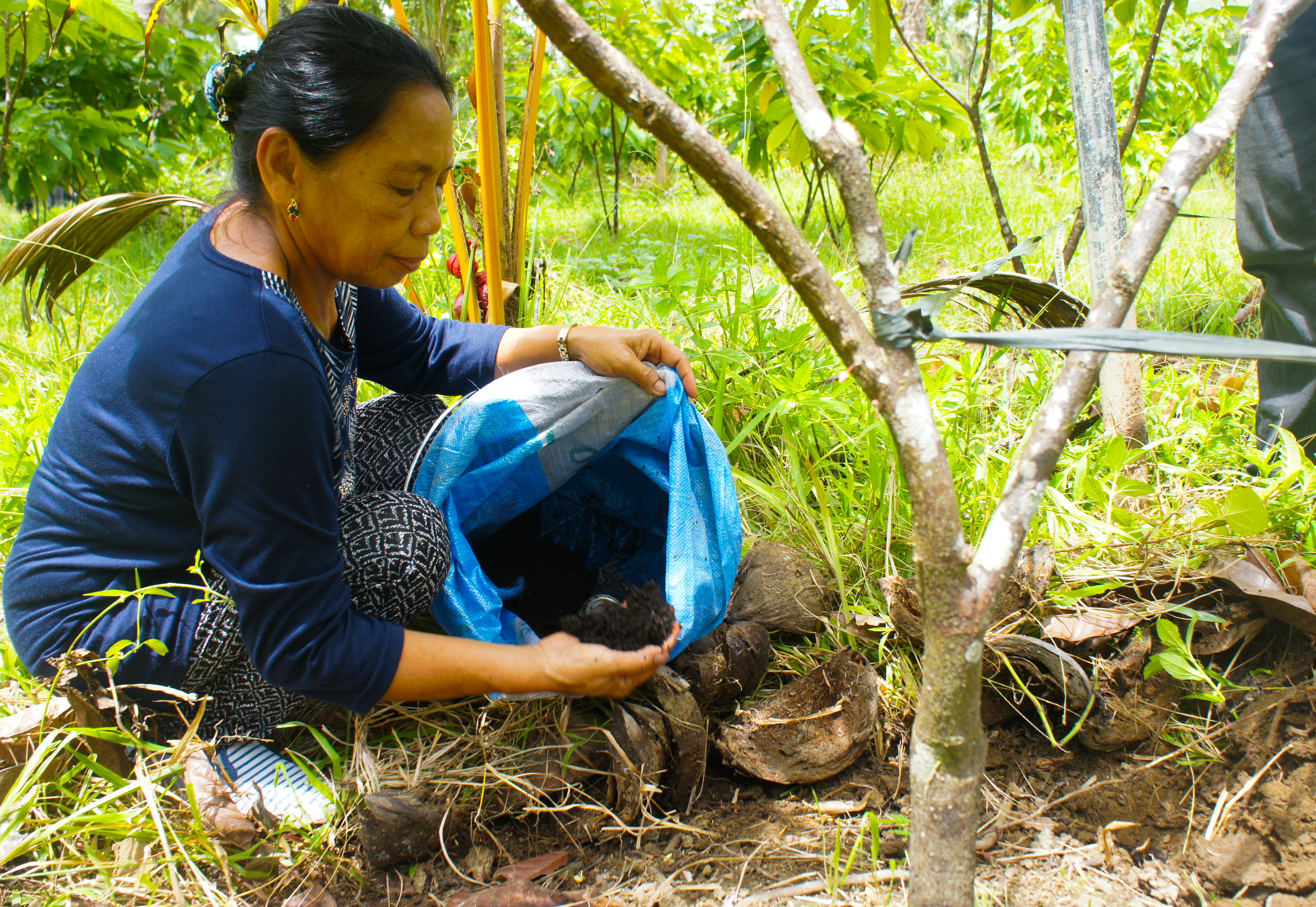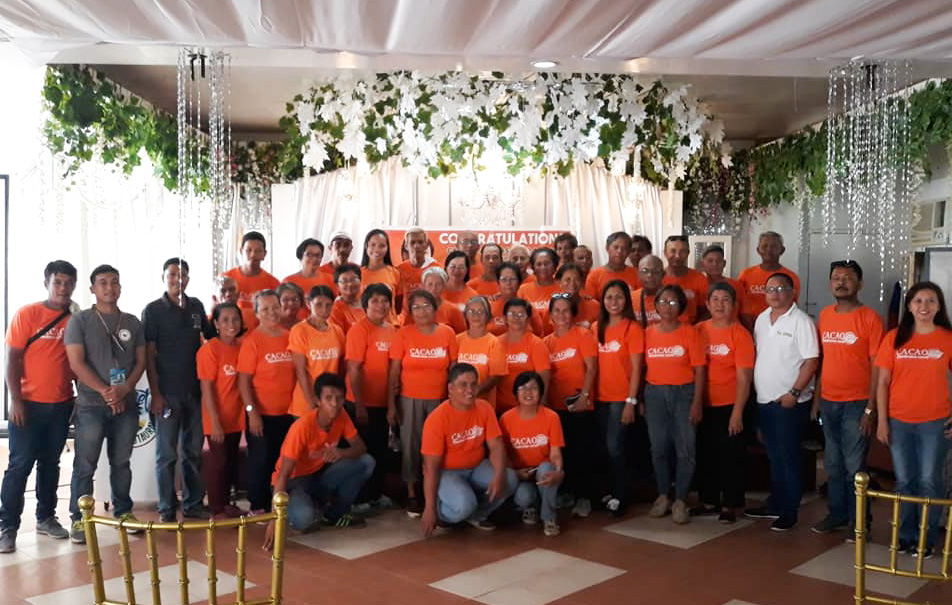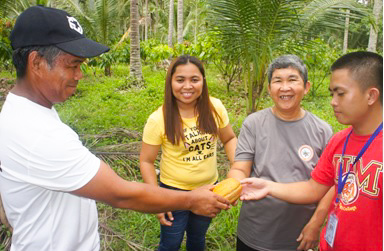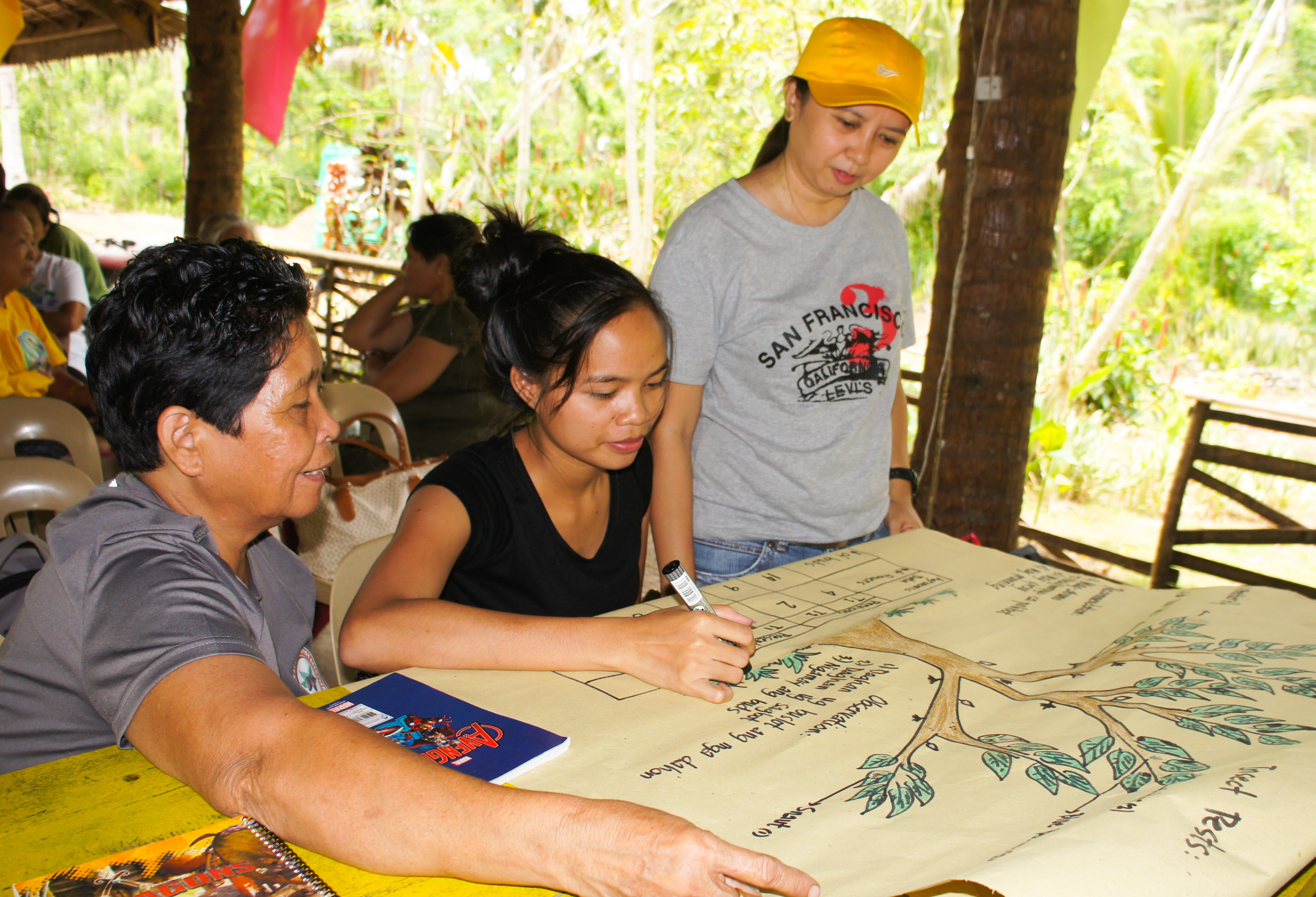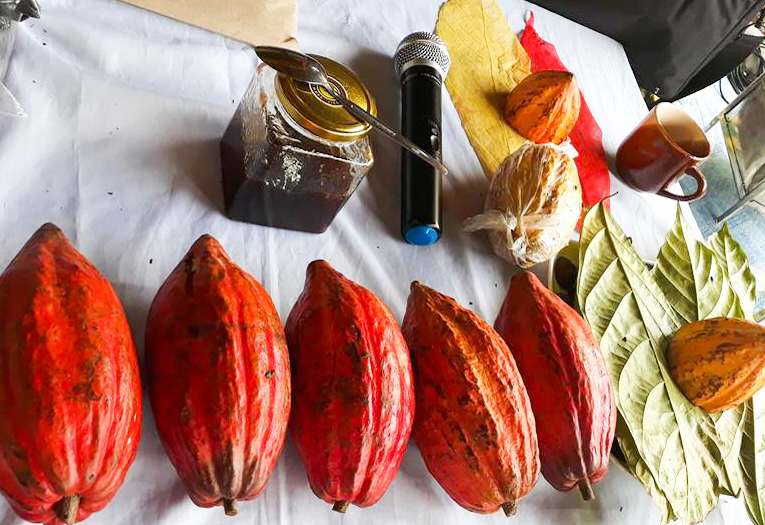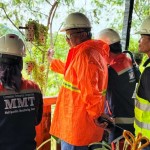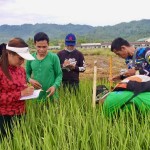-
Practical learning. Nanay Doding Angop-Mandam of the Barangay Lawigan Farmers and Fisherfolks Association in host Tubay Municipality ensures that proper care and composting is being applied to the cacao plants – all in the hopes of a fruitful harvest.
-
Ready to train. The latest batch of Agata’s 43 Cacao Farm School scholars graduate in Cabadbaran City – all equipped and trained to spread the word on Cacao.
-
Helping Marawi farmers. Agata Mabakas Agri-Technician Cristopher Duarte (Left) shares his learnings with an Agriculture student from Marawi University, which sent students to join Agata Farmers during the season-long training, boosting morale on both sides.
-
LGU Cabadbaran Agriculturist Jing Amante (Right) ensures that all students will be able to produce training materials and be able to become fully capable of training other farmers in the field.
-
Cacao value. A short gestation period of 18 months is one of the advantages of this high value crop. The early return on investment and high profitability of the product also ensure good income potential while its diversified use warrants sustainable marketing opportunities.
AMVI and the Department of Agricultural enable host community to imbibe on Cacao farming
Cabadbaran City, Agusan del Norte / November 2018 – Following the successful launch of the Agata-supported Mabakas Techno Demo Farm School – the only TESDA-accredited organic farm school managed by a mining company in the region – Agata Mining Ventures Inc. (AMVI) recently rolled-out its Trainers’ Training Program for Cacao Farmers to help communities capture market opportunities for the crop, which is the main ingredient for commercially-made chocolates.
As part of the company’s Integrated Agricultural / Technical Assistance Program (iAGATAs), the training module is funded through Agata’s Social Development Management Program (SDMP), making the Mabakas Techno Demo Farm School a springboard for high-value crop production such as Cacao farming.
Theobroma Cacao, which is a genus of the Cacao plant, literally translates to “Food for the Gods” in Greek. Due to climate change and rising temperatures, the world’s supply of Cacao may face a shortage within a few years, according Mars – maker of M&Ms, Snickers and Twix chocolates. This trend may see a shift in production to tropical highlands such as the Caraga Region in Mindanao.
A collaboration for development
Agata’s first batch of 136 students who received NC2 certifications in Organic Vegetable Farming were invited by the Agricultural Training Institute (ATI) of the Department of Agriculture as part of its initiative to promote Cacao farming through technical training.
During the four-month program, students underwent rigorous training on Agro-Ecosystem Analysis, Cacao cultural management, management of major pests and diseases, harvesting and post-harvest handling, among other essential topics that include financial management. In addition to theoretical discussions, the trainees also engaged in facilitating workshop sessions and practical field activities.
Among the participants, scholarships for 12 of Agata’s students from Mabakas were provided by the Villar Sipag Foundation – a non-government organizations that bridges public and private sectors in providing agriculture-related trainings and facilities to communities.
“Our aim is to foster a new generation of entrepreneurs from the farming sector,” shared Villar Sipag Mindanao Coordinator Genome Fortun. “With the demand for Cacao farming and the support of Agata, we hope that our upland areas will have a bigger economic yield and transform the (scholars) into technical trainers for other farmers in their communities.”
Green ventures
Most communities in the Agata MPSA are situated in highly lateritic soil and sloping agricultural lands. In other areas, farmers depend only on coconut and root crops that are not enough for livelihood nor sustenance for their families. The roll-out of the Trainers’ Training for Cacao farmers is seen to bring greener opportunities to these communities.
According to the Cacao Industry Roadmap 2017-2022, the Cacao Industry has been gaining recognition in local and overseas markets as the cocoa demand-supply gap increases. The Philippines is conducive for cacao production and is geographically accessible to foreign direct markets.
According to the Philippine National Cacao Industry Council, local farmers and exporters are making an active push for a more dynamic and competitive cacao industry that can compete with other major cacao-growing nations. Cacao production may also significantly alleviate poverty and spur inclusive growth through livelihood and job generation as it only requires a relatively small start-up capital.
“Mining is not forever, but the development and technology brought to the community should outlive mining,” quipped Agata General Manager Emilio III T. Figueroa.
“The responsibility of the mining company is to ensure these developments. These projects that provide communities the needed capacity and technical trainings must be geared towards achieving a better community after mining operations,” he concluded.
Replicating the technology
“Cacao farming is a big help for our farmers. For those in our mining community, we can further develop their farms since it (Cacao) can be intercropped with coconut and banana. We just need to hone their skills and provide further support through the SDMP,” stressed Agata Community Relations Staff and Mabakas Agri-Technician Sheila Mae Arcala.
Agata’s 11 Cacao experts are from Barangay Lawigan in Tubay, Barangay E. Morgado in Santiago, and Barangay Colorado in Jabonga Municipality. They have been attending classes since June this year and will later apply their learnings in Cacao farms owned their people’s organizations.
To date, there are more than 35 hectares planted with Cacao within Agata’s MPSA while over 20 hectares have been established by the indigenous Manobo-Mamanwa Tribe for Cacao production. The Barangay Lawigan-Sua Farmers and Fisherfolks Association also has also planted in more than 14 hectares while the Municipality of Tubay also commenced planting Cacao in its farm lots last September.
More than 7,000 Cacao seedlings stored in the Mabakas Farm are also ready for distribution to other farm sites within the year.
*******

